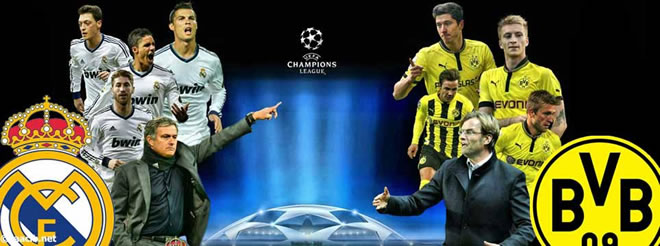

Tuesday, April 30, 2013
The Times will provide coverage and live analysis of Tuesday’s Champions League semifinal second-leg match: Borussia Dortmund at Real Madrid (2:45 p.m. Eastern, Fox Soccer). And make sure to come back Wednesday for the other second-leg semifinal: Bayern Munich at Barcelona.
It’s either over or it’s not. Which side are you on?
The realists say Borussia Dortmund and Bayern Munich settled the Champions League semifinals last week, thumping Real Madrid and Barcelona on consecutive days. The optimists come from a few different camps — Barça and Real supporters fingering their rosary beads, unrepentant contrarians, soccer junkies looking for a fix — but they are united in one opinion: they would like the realists to just hold on a darn second please.
newsinsdeI put myself firmly in the second camp on Sunday when I less-than-seriously gamed out hypotheticals in which both Real Madrid and Barcelona wiped out their deficits to set up a Clásico to end all Clásicos. Were those scenarios likely? Of course not. But don’t go saying that on the streets of Madrid.
In Spain’s capital, Sid Lowe writes in The Guardian, they call it a remontada – a comeback – and it holds a special place in the city’s hearts:
The words of the forward Juanito in April 1986 are now the stuff of legend. Madrid had been beaten 3-1 by Internazionale in the first leg of a UEFA Cup tie and afterwards Juanito warned Madrid’s opponents in cod Italian: “Noventi minuti en el Bernabéu son molto longo.” Ninety minutes in the Bernabéu are a very long time. Whenever Madrid are up against it they invoke the spirit of a player whose words are given added symbolism because he died in a car crash in 1992.
Madrid won the second leg 4-1. There have been other examples too: Madrid beat Anderlecht 6-1 after a 3-0 first-leg defeat in 1984, and in 1985 they beat both Inter – 3-0, having lost the first leg 2-0 – and Borussia Mönchengladbach 4-0, after a 5-1 defeat. The tradition went all the way back to 1976 and a 5-1 win over Derby County having lost 4-1 in the first leg. Opponents came to the Bernabéu and panicked.
So, yes, Dortmund has scored eight goals and surrendered only four in three games against Madrid in this year’s Champions League. But to quote an Italian who knew a little about winning, it ain’t over til it’s over. So why not root for a remontada, at least for a half, and see if things get interesting? Why not savor the 90 minutes — or maybe more — as pure theater, or just as your last Gus Johnson-free game of the tournament (he’ll call Wednesday’s Bayern-Barcelona game, as well as — presumably — the final in London on May 25)?
Or why not tune in this week simply to take a mental picture? That’s what the Goal blog’s Stefan Bienkowski suggests, pointing out that however this week’s games end up, they signal the end of a (brief) glorious era for both Dortmund and Bayern:
One of the most compelling features of European soccer is the quick-paced nature of its constant reinvention. This week, two German contenders stand on the cusp of overthrowing an established Spanish monopoly. Yet even with success on the horizon, these two clubs already bear the signs of inevitable change.
At Dortmund the warning of change looms with an insulting degree of clarity. Last week we learned that Mario Götze would be switching shirts, heading to Bayern Munich for a modest fee of just under $40 million (the rumored amount to buy out his release fee). This week it’s Robert Lewandowski — the Polish striker who had four goals against Real Madrid in the first leg — who stands as a new reminder to his club’s loyal fans that change is afoot.
Like the Ajax side of the mid-1990s that captured the imagination of a continent with a young, attacking team, before ultimately losing all its key players after winning the European Cup in 1995, this Dortmund team looks helpless to the vultures of larger clubs with bigger budgets and more enticing prospects.
In Bavaria a similar story lurks in the shadow of Bayern Munich’s success. Despite the euphoria of domestic and continental domination, Jupp Heynckes’s season of triumph has been undermined since the winter break with the imminent arrival of Pep Guardiola. The Spanish fly in this otherwise perfect ointment has brought out a darker side of Bayern Munich: from composed and dedicated winners to a club always ready to throw suspected champions out the back door for the next best thing.
With plans for next season’s acquisitions already taking shape, the very fabric that makes this Bayern squad so great is already at risk. Where Arjen Robben may glide down the right wing or Thomas Müller battles through the final third to such success now, a new manager and a short-list of replacements in place. For Heynckes and his squad this May is the end of the road, win or lose. Regardless of whether they win their first European Cup in 12 years. Regardless of whether they cement themselves as the definitive force in Europe. Any success promises a bitter aftertaste.
The phrase “out with the old and in with the new” is most fitting in the modern game of soccer, but it underlines the need to stop and appreciate a team we enjoy before the nature of the sport has its way with it.
Perhaps in that sense we should just take a step back this spring and appreciate these two fantastic sides for what they are. Before they’re gone for good.
Corner kick: Check back later for updates, lineups and analysis. Until then, share your thoughts and make your predictions in the comments.